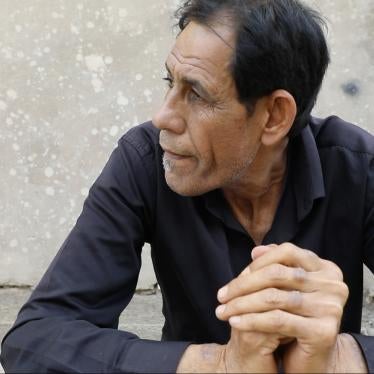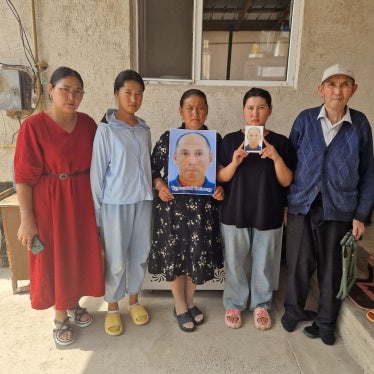October 15, 2014
John Carlin
Assistant Attorney General for the National Security Division
Department of Justice
950 Pennsylvania Avenue, NW
Washington, DC 20530
Molly Moran
Acting Assistant Attorney General for the Civil Rights Division
Department of Justice
950 Pennsylvania Avenue, NW
Room 5643
Washington, DC 20530
Re: U.S. Government Watchlisting
Dear Mr. Carlin & Ms. Moran:
For years, those concerned with fairness and justice in our government’s operations have advocated for greater transparency about federal watchlisting practices. This summer the public learned details about the official watchlisting guidance, which confirmed that the current system labels thousands of people, including American citizens, as suspected terrorists based on loose, exception-ridden standards and secret evidence, inevitably ensnaring innocent persons without offering them a meaningful process to challenge errors and clear their names. A bloated and unfair watchlist system does not make us more secure. Rather, it stigmatizes individuals and communities, erodes our privacy, and undermines cherished constitutional rights. These new disclosures crystallize the need for reform. Accordingly, the undersigned civil rights, human rights, privacy rights, and religious organizations write to request a meeting with you to consider alternatives for reforming the U.S. government’s watchlisting system.
We have been calling for fundamental reform for years. Reform must begin with a full public accounting of these practices and the strengthening of protections against the infringement of civil liberties, human rights, and privacy rights.
The FBI’s Terrorist Screening Center is the hub of the watchlisting system, and it maintains the master watchlist, or Terrorist Screening Database (“TSDB”). Information from the TSDB flows to various other watchlists and databases, including the No Fly List and the Selectee and Expanded Selectee Lists. Individuals on the No Fly List are prohibited from flying to, from, or over U.S. territory. Individuals on the Selectee and Expanded Selectee Lists are subjected to additional questioning, inspection, and screening before being allowed to board flights to, from, or over U.S. territory.
The standards for inclusion on government watchlists are broad and vague. For example, inclusion on the master watchlist requires only reasonable suspicion. Reasonable suspicion, as the government has defined it, requires neither “concrete” nor “irrefutable evidence,” and can be based on unverified information or inferences an official draws “in light of his/her experience.”
This standard is so low that the government’s guidelines specifically allow for a single, uncorroborated source of information—including a Facebook or Twitter post—to serve as the basis for placing an individual on the master watchlist. Even information of questionable or doubtful reliability can support “reasonable suspicion”; only information from sources actually “known or determined to be unreliable” is rejected.
Moreover, because the watchlists are not limited to known, actual terrorists, an official can watchlist a person if he or she has reasonable suspicion to believe that the person is a suspected terrorist. In other words, individuals can be watchlisted if they are suspected of being suspected terrorists.
If the reasonable suspicion standard were not troubling enough, the government’s self-mandated watchlisting guidance is riddled with loopholes and exceptions that permit watchlisting without even a showing of reasonable suspicion. For example, non-citizens can be watchlisted simply for being associated with a watchlisted person even if their relationship with that person is entirely innocuous. Another catch-all exception allows non-citizens to be watchlisted based on fragmentary or uncorroborated information, or information of “suspected reliability.”
The result is a watchlisting system that is unreliable and discriminatory. Members of religious, racial, ethnic, and national origin minority communities and activists regularly report to many of the undersigned national and community organizations their experiences of watchlisting based on what appears to be political activism and/or religious observance. Members of these communities are stigmatized, often publicly, and the religious expression of many, especially American Muslims, is chilled. Recent revelations have confirmed these individual experiences, showing that Dearborn, Michigan—a city with fewer than 100,000 residents that is home to a large concentration of Arab Americans—has more watchlisted individuals than any city in the United States other than New York City. This fact alone presents strong evidence of racial, ethnic, national origin and religious profiling.
Watchlists raise significant civil liberties concerns. In addition to “watching” the individuals on watchlists, there are other consequences that can be severe. Placement on the No Fly List means an inability to travel by air or sea, while placement on other watchlists can mean invasive screening at airports, denial of a U.S. visa or permission to enter to the United States, and detention and questioning by U.S. or foreign authorities—to say nothing of shame, fear, uncertainty, and denigration as a terrorism suspect. Watchlists can separate family members for months or years, isolate individuals from friends and associates, and ruin employment prospects.
Compounding this unfairness is the fact that the government fails to provide wrongly or mistakenly watchlisted individuals with an effective mechanism of redress. The government’s official policy is to refuse to confirm or deny whether an individual is watchlisted, even after the fact. Watchlisted individuals are thus denied a meaningful opportunity to contest their placement and clear their names. The result is that innocent people can languish on watchlists indefinitely, without real recourse. Indeed, as a federal court recently recognized, the lack of a meaningful process for people to challenge their inclusion on the No Fly List violates the Fifth Amendment’s guarantee of due process.
Watchlisting also raises serious privacy concerns. Government officials routinely collect the biometric data of watchlisted individuals, including facial images, iris scans, fingerprints, and DNA strands, and law enforcement has likewise been directed to gather any and all available evidence when encountering watchlisted individuals, including receipts, business cards, health information, and bank statements. This information, in turn, is shared with others. The master watchlist is accessible to at least 22 foreign governments, numerous federal agencies, state and local law enforcement, and even private contractors.
The government’s watchlisting system amounts to an unchecked exercise of power over innocent citizens and non-citizens alike. Such a system is inimical to national security. Watchlists saturated with innocent persons divert attention from real, genuine threats and waste scarce resources.
If the government is to use watchlists, it must ensure a full public accounting of these practices; that the standards for inclusion are narrow and specific; the evidence being relied upon is accurate and credible; the manner in which the lists are used is appropriately limited and consistent with the presumption of innocence; and the redress and periodic review procedures comport with core constitutional requirements of fairness and due process.
As organizations that support your commitment to civil liberties and the vitality of our Constitution, we would appreciate the opportunity to discuss these matters further. If we can provide any information in advance of the meeting or scheduling details, please contact ACLU legislative counsel Arjun Sethi at 202-715-0823.
Sincerely,
Access California Services
Advocacy for Principled Action in Government
American Civil Liberties Union
American Muslim Alliance
American Muslims for Palestine
American-Arab Anti-Discrimination Committee
Appeal for Justice
Arab American Association of New York
Arab American Family Support Center
Arab American Family Support Center
Arab American Institute
Arab Muslim American Federation
Asian Americans Advancing Justice - Asian Law Caucus
Association of Muslim American Lawyers
Center for Constitutional Rights
Center for Financial Privacy and Human Rights
Center for Media and Democracy
Charity and Security Network
Citizens for Responsibility and Ethics in Washington
The Constitution Project
Constitutional Alliance
Constitutional Law Center for Muslims in America
Consumer Action
Consumer Federation of America
Consumer Watchdog
Council on American-Islamic Relations
Creating Law Enforcement Accountability & Responsibility (CLEAR) Project, CUNY School of Law
Defending Dissent Foundation
DRUM - South Asian Organizing Center
Friends of Human Rights
Government Accountability Project
Hindu American Foundation
Human Rights Clinic at Santa Clara Law
Human Rights Watch
Interfaith Alliance
Islamic Circle of North America
Islamic Society of North America
Liberty Coalition
Muslim Advocates
Muslim American Civil Liberties Coalition
Muslim American Society Public Affairs and Civic Engagement
Muslim Bar Association of New York
Muslim Community Network
Muslim Legal Fund of America
Muslim Public Affairs Council
National Association of Social Workers
National Coalition Against Censorship
National Coalition to Protect Civil Freedoms
National Council of Jewish Women
National Network for Arab American Communities
National Religious Campaign Against Torture
National Workrights Institute
OpenTheGovernment.org
Partnership for Civil Justice Fund
PEN American Center
Project Censored
Reprieve US
Shoulder to Shoulder
Sikh American Legal Defense and Education Fund
The Sikh Coalition
South Asian Americans Leading Together
Sunlight Foundation
T’ruah: The Rabbinic Call for Human Rights
UNITED SIKHS
US Council of Muslim Organizations
Women In Islam, Inc.
YWCA USA







